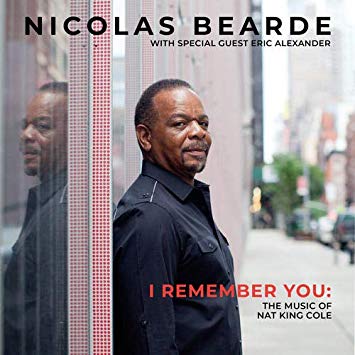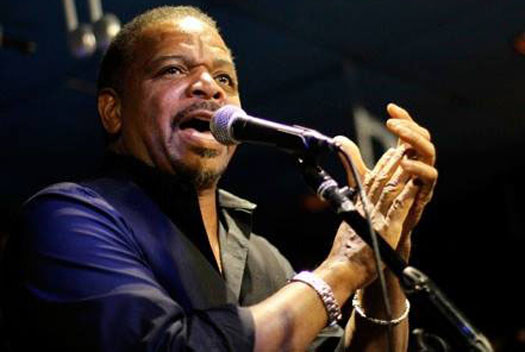Jazz interview with jazz veteran vocalist Nicolas Bearde. An interview by email in writing.
JazzBluesNews.com: – When you improvise, you know where you’re going. It’s a matter of taking certain paths and certain directions?
Nicolas Bearde: – I try to keep my mind as open as possible when I improvise. I pick up cues from the rhythm section, the “color” of the harmonies and of course the melody is always a good reference from which to make variances. But it’s really difficult to “think” your way through an improvised stretch-I believe you have to get out of the way and trust that what you need will come to you. Also understand that there are many directions an improv can go, even if you think you have some direction, things can change in an instance. If you’re truly improvising, you have to let go. Of course if you have to get back to a bridge, verse or a chorus or some other set passage in a piece you can (and will, in most cases) shape your improv instinctively, in such a way as to smoothly return to the form of that section.
JBN: – Do you ever get the feeling that music majors, and particularly people who are going into jazz, are being cranked out much like business majors? That they are not really able to express themselves as jazz musicians?
NB: – That’s difficult to answer. Though I will say that there are some very “learned” players out there now, making good music. Music is a difficult business and anything that gives you an edge to play better and be smarter about how to advance in this challenging industry is a plus. To be a professional musician is to wear many hats these days so the more you know about music technically and various aspects of the “business of music” can only help.
As to emotional commitment, I think once a person has gone through the level of study required to become a decent jazz musician, that they might have at least begun to wrestle with the emotional commitment and financial struggles that one frequently endures on this path. Whether they become good players is very subjective thing-a full house (or it’s opposite) is usually a good indicator of how well a player is expressing themselves as artists.
JBN: – What about somebody who is really gifted and puts together a band and just gets upset to the point of quitting because of the business aspects-the agents and the clubs?
NB: – This happens I guess. But it’s a part of the world we inhabit. Somebody’s got to handle those things in order for the work to be heard. Artists are taking on more of that these days but it’s difficult to “go deep” into your studies, practice time, repertoire development, songwriting or other creative aspects of making music while also focusing on recording, traveling and performing. Oh and don’t forget that you then have to spend time trying to book gigs and likely put in a bit of time on different types of social media and other services, trying to market yourself. That’s just a lot of stuff to do on your own! But that’s where we are now. Of course the old system had it’s pitfalls as well, often times with artists being left with little more than their names-and in some cases not even that!
One has to go into this game with eyes wide open! No one is going to watch your back better than you-and hopefully your team (yes, you need people around you to handle the support work that you can’t or don’t have time to do!) But again, learn the business, even for local gigs. Learn what club owners and bookers need to make their businesses successful and how you performing there can help his (or her) business. That’s what that side of music is fueled by. It’s part of the game.
JBN: – How to prevent disparate influences from coloring what you’re doing?
NB: – That’s also difficult to asses-how to gauge what might infuence the music? I think one can listen to a lot of music and still maintain integrity. When it comes to original composition however, you must be careful to make sure you aren’t subliminally taking pieces of someone’s music. Other than that you must learn to trust your own inner voice.
JBN: – What do you love most about your new album 2019: < I Remember You: The Music Of Nat King Cole >, how it was formed and what you are working on today.
NB: – I like that we took an unexpected direction with this music. Too often I think that artists will try to evoke some aspect of the musician or singer that they intend to honor. Working with Josh and the rest of the players, we all quickly came to the unspoken understanding that we were just going to work in a way that reflected our own individual styles. Also since we were working on material that much of the band had not heard or played before, we didn’t have to struggle against ingrained performances of Nat’s classics.
I’m just beginning work on a project featuring the music of Joe Williams, with perhaps some recording possible next year.

JBN: – What’s the balance in music between intellect and soul?
NB: – I’m not sure what direction to go in regarding this question. For me, music always affects my soul first. I frequently find myself having to replay a song that’s new to me because I’ve only “listened” to the vibe of the song-the words become important once I understand the music’s ‘’heart “ if you will. In a well-composed song, I’ll frequently hear it all in one pass. Many of the classic songs have that quality about them.
JBN: – There’s a two-way relationship between audience and artist; you’re okay with giving the people what they want?
NB: – In a certain respect that’s ok, depending on what I’m type of show I’m presenting-but I do have the music that I write and record and the audience gets that or not. However, as an entertainer, I try to gauge what in my repertoire might get an audience inspired, without pandering to them.
JBN: – Please any memories from gigs, jams, open acts and studio sessions, which you’d like to share with us?
NB: – Not anything specifically.
JBN: – How can we get young people interested in jazz when most of the standard tunes are half a century old?
NB: – Yeah, I know. It’s a conundrum in a sense… Because many of those tunes are so well constructed. Young artists should study them for their classic chord progressions and over-all construction. Many of these tunes are, and will continue to be, recorded as jazz pieces for years to come. But you are correct; there can be stagnation if that’s all a young player focuses on. It’s up to young players to take a chance and integrate new musics into the jazz lexicon.
JBN: – And lastly, being a teacher, do you find it difficult to write music yourself?
NB: – It seems to be more difficult to finish songs these days. I’m doing more live performances and the preparation time involves more than just acquiring charts, I find the creative juices require more time to allow my inner voice to be heard over all of the other chores of any given day. I’ve got a lot of “snippets” on my recorder and in my journals that I’m looking forward to getting into soon.
JBN: – How important is it to you to have an original approach? Can you comment on the bridge between being a musician and being a composer?
NB: – I don’t write as much as I’d like but for now, that might be enough. I really enjoy live performance and if I had to choose one over the other, I’d probably choose performance over composition-though I do enjoy the process of taking a piece from “a germ” of an idea to a completed piece. I feel that if I’ve truly listened to my muse I’ll be working from my own unique perspective.
JBN: – Do you have an idea of what it is you’re trying to say or get across? Is it an idea or is it just something that we feel?
NB: – When I am writing a song, I usually have a strong idea of what I’m looking for musically but lyrical direction can often take a bit of time. But then again, If I have the title, sometimes the lyrics just seem to “fall out of my head” onto paper in one sitting. I love it when that happens…
JBN: – What do you see for your extended future? You know what you have going on? You have life, If you could change one thing in the musical world and it would become a reality, what would that be?
NB: – I plan to continue on my path; record at least three more projects that I have in mind and eventually, watch my grandkids grow up and take their places in the world. My golf game needs some work as well…
The music world is changing too rapidly at this point. It’s difficult to function in it as is and it seems near impossible to predict where it’s going to go.
Talk of conundrums: Music sales are going to streams and downloads and yet vinyl sales are climbing every day! Who could have predicted any of this?
JBN: – Who do you find yourself listening to these days?
NB: – My listening program is all over the map so to speak. New Jazz one day, symphonic works of Debussy or Stravinsky the next. Something classic from Joe Williams and Johnny Mathis or Hip Hop and R&B from Kendrick Lamar and Beyonce or compositions from Joni Mitchell, The Epic work of Kamasi Washington or vocals from Kurt Elling might be lighting up my road-rocket player while I’m driving to a gig or something. Or I might be pulling up some 60’s or 70’s soul and R&B when everyone’s out of the house and I can turn it up (it needs to be loud!)
JBN: – What is the message you choose to bring through your music?
NB: – Be good to somebody! Everyday!
JBN: – Let’s take a trip with a time machine, so where and why would you really wanna go?
NB: – I’m good right here, right now. I think I can do more to make this country and this planet yield its promises for my (and your) children and grandchildren. I want to help clean up all this mess, regain our focus and get back to some kind of fairness, equity and sanity for all in our politics and in our communities. The future might be quite a tattered mess, to put it gently. And why would I want to time-hop to that?
JBN: – I have been asking you so far, now may I have a question from yourself…
NB: – When did this love for music develop in your life?
JBN: – Thank you for answers. Since 2002, when I was live concerts jazz musicians …
Interview by Simon Sargsyan







More Stories
Interview with Janis Siegel of The Manhattan Transfer: Jazz, being a more refined, interpreted form of music
CD review: George Benson – Dreams Do Come True: When George Benson Meets Robert Farnon – 2024: Video, CD cover
The band was tight as ever. The Warren Haynes Band cuts loose: Video, Photos